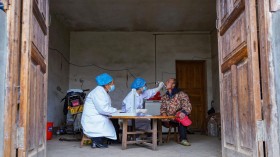Scientists have developed a system that can forecast a dengue fever outbreak based on phone calls.
The team of researchers from the New York University analyzed the calling behavior of citizens to a public-health hotline and developed a disease-surveillance system that can forecast an outbreak two to three weeks ahead of time.
"Thousands of lives are lost every year in developing countries for failing to detect epidemics early because of the lack of real-time data on reported cases," Lakshminarayanan Subramanian, a professor at the New York University's Courant Institute of Mathematical Sciences and co-author of the study, said in a press release.
"We think our technique can be of use to public-health officials in their fight against the spread of crippling diseases."
In the study, which was published in the journal Science Advances, the researchers analyzed over 300,000 calls to the health hotline during the 2011 dengue outbreak in Lahore, Pakistan to forecast the number of dengue cases across the city and at a block-by-block level over a period of two years. The team then matched their predictions with the actual number of cases reported in the hospitals.
Results indicated that the model was accurate in its predictions. Moreover, the system not only flagged an outbreak but also accurately forecasted the number of patients and their locations two or three weeks ahead.
"To the best of our best knowledge, this system is the first to demonstrate, with significant empirical evidence, that an accurate, locality-specific disease forecasting system can be built using call volume data from a public health hotline," Subramanian said.
According to the researchers, the forecasting model alerts public health officials on the number of patients and gives them adequate time to clear the area of stagnant water or trash where dengue was likely to strike.
Subramanian and co-researcher Shankar Kalyanaraman developed the system with the help of scientists at the Information Technology University in Lahore and the Punjab Information Technology Board.
The system had been applied following the Lahore dengue outbreak in 2011, which affected 21,000 people and killed 350. Upon implementing the forecast model, the number of cases was reduced to 257 in 2012 and 1,600 in 2013, Deccan Herald reports.
"This makes health hotlines ideal for resource-constrained environments in developing countries," Umar Saif, vice chancellor of Information technology University, Punjab and chairman of the Punjab Information Technology Board, said in a statement.
© 2024 NatureWorldNews.com All rights reserved. Do not reproduce without permission.
![Severe Weather Threat to Impact Over 40 Million Americans Across Central US [NOAA]](https://1471793142.rsc.cdn77.org/data/thumbs/full/70189/280/157/50/40/severe-weather-threat-to-impact-over-40-million-americans-across-central-us-noaa.jpg)




